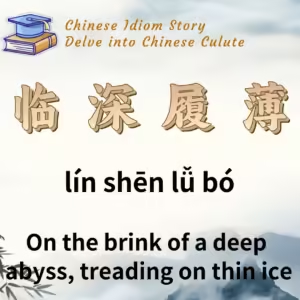
Chinese Idiom: 临深履薄 (Lin Shen Lu Bo)
English Translation: On the brink of a deep abyss, treading on thin ice
pīn yīn: lín shēn lǚ bó
Idiom Meaning: This idiom describes a state of being extremely cautious and careful, especially in a precarious situation.
Historical Source: The idiom comes from the classic text “The Book of Songs” (《诗经》), specifically the poem “Xiao Min” (《小旻》).
Idiom Story:
During the late Western Zhou period, King You of Zhou (周幽王) ruled with decadence and corruption, neglecting talented individuals while promoting unscrupulous officials. This led the state to the brink of collapse, causing concern and fear among those with political foresight within the ruling class.
In response to this dire situation, a nobleman expressed his feelings through poetry, culminating in the poem “Xiao Min.” The poem consists of six sections with a total of forty-eight lines. The first two sections describe the poor choices of King You, while the third laments the incompetence of the ruling court. The fourth section highlights the abandonment of wise governance in favor of shallow advice. The fifth points out the existence of capable leaders who are overlooked by the king. The sixth section metaphorically depicts the natural world, emphasizing the imminent danger facing the state, which instills deep fear.
The sixth section reads:
不敢暴虎,不敢冯河。
人知其一,莫知其他。
战战兢兢,如临深渊,
如履薄冰。
In translation, this passage means:
- “One does not dare to strike a tiger; one does not dare to cross a river on foot.
People know one danger, but do not perceive others.
Trembling and cautious, as if facing a deep abyss,
As if treading on thin ice.”
The essence of this passage is that while people recognize the danger of confronting a tiger or crossing a river, they fail to see the imminent peril their country faces. The speaker is overwhelmed with fear, likening the anxiety of their situation to standing on the edge of a deep chasm or walking on fragile ice.
As a result, the phrase “如临深渊,如履薄冰” (like facing a deep abyss and treading on thin ice) was later condensed into the idiom “临深履薄,” which signifies the need for caution and vigilance in uncertain or dangerous circumstances.






